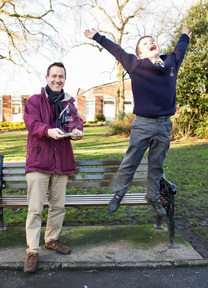Avatar therapy 'reduces frequency of schizophrenia voices'
Experts are hopeful that an experimental new therapy using avatars could improve treatment for auditory hallucinations.

Startling findings in a new study, published by the Lancet, show that the new therapy could be more successful in treating auditory hallucinations of schizophrenia patients than traditional methods such as talking therapies and medication.
The experimental therapy involves a face-to-face discussion between a person with schizophrenia and an avatar representing their auditory hallucination.
Aim of treatment - power shift from the avatar to the patient
Lead author, professor Tom Craig from King’s College London, said: “A large proportion of people with schizophrenia continue to experience distressing voices despite lengthy treatment, so it is important that we look at newer, effective and shorter forms of therapy.”
“Our study provides early evidence that avatar therapy rapidly improves auditory hallucinations for people with schizophrenia, reducing their frequency and how distressing they are, compared to a type of counselling. So far, these improvements appear to last for up to six months for these patients.”
The Mental Health Foundation estimates that between five per cent and 28 per cent of the general population hear voices that other people do not. Many of those have schizophrenia and other conditions.
The research paper reports that around 60-70 per cent of people who have schizophrenia experience auditory hallucinations that are typically insulting and threatening.
The avatar trial, which included 150 patients, took place at Maudsley Hospital SHARP clinic and the Institute of Psychiatry, Psychology & Neuroscience at King’s College London. Of this number, 75 people had the avatar therapy and the other half had a form of supportive counselling. The avatar group’s symptoms were rated as less severe than those who received counselling after only 12 weeks.
The research was funded by the Wellcome Trust, which also funded the initial pilot trial in 2015. This, however, is the only large-scale clinical trial so far.
Presumed persecutor
The avatar treatments consisted of six sessions of therapy with one 50-minute session each week. Consultation before treatment involved working with a therapist to create a computerised simulation (avatar) - a voice they want to have influence over. The avatar, which represents their presumed persecutor, is voiced by the therapist who communicates with the patient.
The overall aim of treatment is for the avatar to respond by becoming less hostile, with power shifting from the avatar to the patient.
‘Voices’ as entities or agents 'previously discouraged' in mainstream psychiatry
Sessions were recorded and an audio recording was given to the patient to take home to listen to when they heard the voices. This is a very different approach to other virtual reality experiments for schizophrenia.
Dr Ben Alderson-Day from the Department of Psychology at Durham University, said: “Technology can both obscure and enhance our view of reality, but in the case of Avatar, it seems to provide a powerful method of personifying and externalising an otherwise internal and often intrusive phenomenon.
“Thinking of voices as entities or agents that can be engaged with is a notion largely ignored or discouraged for many years within mainstream psychiatric thinking.”
Despite early promising results, the study lead highlights that results only come from one treatment centre and advocated that more research was needed to optimise the way the treatment is delivered, and to demonstrate that it is effective in other NHS settings. For this reason, the treatment isn’t widely available yet, but the researchers of the trial are hopeful that it could be a new area of study in the treatment of auditory hallucinations.
Ann Mills-Duggan, from Wellcome’s Innovations team, which funded the £1.3m trial, said: "Schizophrenia affects 1 in 100 people, often with a devastating effect, making it impossible for people to work and sustain relationships.
"Avatar therapy is a promising new approach and these early results are very encouraging. If the researchers can show that this therapy can be delivered effectively by different therapists in different locations, this approach could radically change how millions of psychosis sufferers are treated across the world."
Latest Innovative Care News
 13-May-19
'Pink drink' brain cancer treatment rolled out across NHS in memory of Baroness Jowell
13-May-19
'Pink drink' brain cancer treatment rolled out across NHS in memory of Baroness Jowell
 25-Apr-19
Louis Tomlinson helps 83-year-old who lost wife to dementia complete bucket list
25-Apr-19
Louis Tomlinson helps 83-year-old who lost wife to dementia complete bucket list
 05-Mar-19
Care worker of the year inspires nine-year-old son to work in care
05-Mar-19
Care worker of the year inspires nine-year-old son to work in care
 12-Feb-19
Michael McIntyre's jokes tested to see if they stop elderly catching flu
12-Feb-19
Michael McIntyre's jokes tested to see if they stop elderly catching flu
 25-Jan-19
Ninety-year-old and his dog can stay together, thanks to care worker
25-Jan-19
Ninety-year-old and his dog can stay together, thanks to care worker